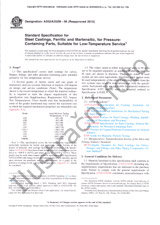Potřebujeme váš souhlas k využití jednotlivých dat, aby se vám mimo jiné mohly ukazovat informace týkající se vašich zájmů. Souhlas udělíte kliknutím na tlačítko „OK“.
ASTM F2723-21
Standard Test Method for Evaluating Mobile Bearing Knee Tibial Baseplate/Bearing Resistance to Dynamic Disassociation
Přeložit název
NORMA vydána dne 1.3.2021
Informace o normě:
Označení normy: ASTM F2723-21
Datum vydání normy: 1.3.2021
Kód zboží: NS-1019463
Počet stran: 5
Přibližná hmotnost: 15 g (0.03 liber)
Země: Americká technická norma
Kategorie: Technické normy ASTM
Kategorie - podobné normy:
Anotace textu normy ASTM F2723-21 :
Keywords:
ICS Number Code 11.040.40 (Implants for surgery, prothetics and orthotics)
Doplňující informace
| Significance and Use | ||
|
3.1?This test method includes the use of static and fatigue shear and bending force conditions to evaluate the bearing retention mechanism of a mobile bearing knee design and its ability to prevent disassociation. 3.2?In general, disassociation does not occur during activities where the contact locations are within the boundaries of the bearing surfaces. Disassociation is most likely to occur with forces at the edges of the bearing component or with large AP shear forces on a posterior stabilized knee tibial component post. Extreme bearing rotation, bone/bearing impingement, severe varus or valgus moments, high flexion, or any combination of these can increase the likelihood of disassociation. 3.3?The test method described is applicable to any bicompartmental mobile bearing knee with a bearing retention mechanism. With modification, the test can be applied to a unicompartmental mobile bearing knee with a bearing retention mechanism. |
||
| 1. Scope | ||
|
1.1?This test method describes a laboratory method for evaluating the potential for mobile bearing knee tibial baseplate/bearing disassociation under repeated forces. 1.2?The test described is applicable to any bicompartmental mobile bearing knee with a bearing retention mechanism. With modification, the test can be applied to a unicompartmental mobile bearing knee with a bearing retention mechanism. 1.3?Although the methodology described does not replicate all physiological force conditions, it is a means of 1.4?The values stated in SI units are to be regarded as standard. No other units of measurement are included in this standard. 1.5?This standard does not purport to address all of the safety concerns, if any, associated with its use. It is the responsibility of the user of this standard to establish appropriate safety, health, and environmental practices and determine the applicability of regulatory limitations prior to use. 1.6?This international standard was developed in accordance with internationally recognized principles on standardization established in the Decision on Principles for the Development of International Standards, Guides and Recommendations issued by the World Trade Organization Technical Barriers to Trade (TBT) Committee. |
||
| 2. Referenced Documents | ||
|
Doporučujeme:
Aktualizace zákonů
Chcete mít jistotu o platnosti užívaných předpisů?
Nabízíme Vám řešení, abyste mohli používat stále platné (aktuální) legislativní předpisy.
Chcete vědět více informací? Podívejte se na tuto stránku.




 Cookies
Cookies
